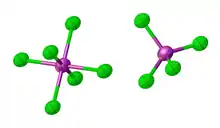Molecular autoionization
Molecular autoionization (or self-ionization) is a reaction between molecules of the same substance to produce ions. If a pure liquid partially dissociates into ions, it is said to be self-ionizing.[1]:163 In most cases the oxidation number on all atoms in such a reaction remains unchanged. Such autoionization can be protic (H+
transfer), or non-protic.
Examples
Protic solvents
Protic solvents often undergo some autoionization:
- 2 H
2O ⇌ H
3O+
+ OH−
The self-ionization of water is particularly well studied, due to its implications for acid-base chemistry of aqueous solutions.
- 3 HF ⇌ H
2F+
+ HF−
2 [1]:221 Here proton transfer between two HF combines with homoassociation of F−
and a third HF to form HF−
2.

Non-protic solvents
- N
2O
4 ⇌ NO+
+ NO−
3 [1]:217 Here the nitrogen oxidation numbers change from (+4 and +4) to (+3 and +5).
These solvents all possess atoms with odd atomic numbers, either nitrogen or a halogen. Such atoms enable the formation of singly charged, nonradical ions (which must have at least one odd atomic number atom), which are the most favorable autoionization products. Protic solvents, mentioned previously, use hydrogen for this role. Autoionization would be much less favorable in a solvent such as sulfur dioxide or carbon dioxide which has only even atomic number atoms.
Coordination chemistry
Autoionization is not restricted to neat liquids or solids. Solutions of metal complexes exhibit this property. For example, compounds of the type FeX2(terpyridine) are unstable with respect to autoionization [Fe(terpyridine)2]2+[FeX4]2−.[3]
See also
References
- Housecroft C.E.; Sharpe A.G. (2005). Inorganic Chemistry (2nd ed.). Pearson. ISBN 0130-39913-2.
- Finch, A.; Fitch, A.N.; Gates, P.N. (1993). "Crystal and Molecular structure of a metastable modification of phosphorus pentachloride". Journal of the Chemical Society, Chemical Communications: 957–958. doi:10.1039/C3993000095.CS1 maint: uses authors parameter (link)
- Kamata, K.; Suzuki, A.; Nakai, Y.; Nakazawa, H., "Catalytic Hydrosilylation of Alkenes by Iron Complexes Containing Terpyridine Derivatives as Ancillary Ligands", Organometallics 2012, 31, 3825-3828. doi:10.1021/om300279t